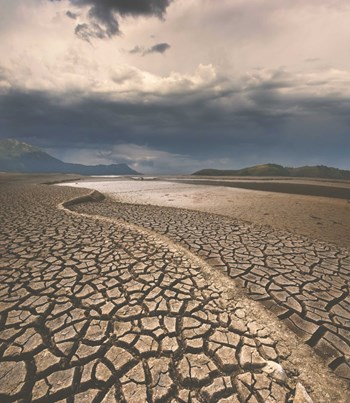
Water, water everywhere, and not a drop to drink,” goes the old saying. When there’s a water shortage, that saying takes on new meaning—not only is there not a drop to drink, but not a drop to water the lawns. And what is the Garden State without gardens?
Yes, everyone’s aware of energy conservation and the need to save energy—but what about water conservation?
Many cities and towns in New Jersey face ongoing water shortages, despite seasons when it seems to rain and snow constantly. These shortages can in turn lead to curbs on water use, for example, bans on watering lawns between certain hours. But they can also be a spur to better water conservation measures, such as installing low-flow shower heads.
According to Lawrence Hajna, a spokesman for the New Jersey Department of Environmental Protection, the most pronounced drought in the state took place in the 1960s, followed by two droughts in the 1980s (1980-82 and 1984-85) and a four-year drought that began in 1999 and ended in a water emergency in 2003-04.
In general, he says, the state has experienced intermittent water shortages due to “true” droughts, but also due to high water demands during periods of hot, dry weather.
Even in the aftermath of a drought when a community sees rainy weather, Hajna says a water shortage can linger if the reservoirs don’t fill up as quickly as they should. If this is the case, townships may opt to impose water restrictions.
Other Factors
It may surprise some readers that water and precipitation are not the only factors that are involved in water shortages. New Jersey is a lot better off than many other states—especially in the Southwest. Indeed, the state climatologist has calculated that annual rainfall over the past 10 years in New Jersey is nearly 5 inches above the long-term average.
Gaetano Virone, president and CEO of Environmental Designers Irrigation in Howell, believes that, “The real problem is usually that the water distribution infrastructure has not been upgraded to handle the peak water demand during the peak summer months. What this means is that not only is the piping not capable of supporting the usage, but many townships have not upgraded the water supply to accommodate the recent building boom, which in turn has created a shortage of the water supply.”
And Hajna adds that the northern half of the state is more susceptible to water shortages due to population density and the types of water sources there (reservoirs, surface water streams, relatively smaller aquifers), compared to the expansive aquifers in the coastal plain. An aquifer is a wet underground layer of water-bearing permeable rock, gravel, sand or silt from which groundwater can be extracted by means of a well—which brings us to the next topic.
Wells and Rainwater
Most homeowner associations use municipal water supplies, not wells, for most of their needs, even in semi-rural areas.
While there are some that use well water, says Mary Faith Nugiel, president of RCP Management Co. in Monroe, it’s mainly for their sprinkler systems. Moreover, she says, the state has very strict guidelines for water usage from wells, especially for sprinkling lawns, and it’s important that the manager and association understand the guidelines for well-water consumption.
In any case, although well-water use is often exempted from routine municipal limits on water, the state may also restrict water use from a well during a state of water emergency. Clearly, the use of wells–or, in a few cases, lakes or ponds—is no panacea for water problems.
Another unconventional tactic is rainwater harvesting. Why not capture some of the rainwater and put it to use (not for drinking, of course) rather than letting it go down the drain or seep into the earth?
Most of the experts interviewed for this article agreed that use of rainwater is not cost-effective and is rarely used in New Jersey communities. Still, Hajna says that the technique is available for those who want to use it. Individual owners can place rain barrels under a drainage spout, and the water can be used for irrigation.
Aside from its mostly small-scale applicability, another drawback to use of rainwater is that this water might not be clean or pure by accepted standards. Allan Samuels, partner of Energy Squared, an affiliate of Kipcon in North Brunswick, believes that water recycling is much cheaper and much better. Recycled water that has been treated can be used for flushing toilets, possibly washing clothes and more.
Meeting the Challenge
Now that we know that there are water shortages, what effect does this have on the way condominiums handle their water use, both for landscaping and other uses like laundry rooms? And how big an expense is water in the overall condo budget picture?
Nugiel says that densely populated areas tend to have higher water charges. While some associations are investigating water conservation methods, most would need major retrofits to install any conservation equipment. Furthermore, she says, “Most associations will not benefit from the savings, since water is paid directly by the homeowner in the majority of cases.”
Ed Corless, vice president of lifestyle services for Wentworth Property Management, which has offices in several New Jersey communities, concurs that most condo homes are separately metered for domestic water. “However,” she says, “water use for irrigation is costly. This could be a major expense for associations with common irrigation systems.
“Homeowners rarely accept that in this area of the country, grass turns brown as a normal part of the life cycle during hot summer months,” Corless adds.
In reference to laundry rooms, Nancy Zafft, vice president of Hudson Harbour in Edgewater, says her condo had their washing machines retrofitted last year, replacing top-loaders with more efficient front-loaders.
Virone argues that “most irrigation systems are less than 30 percent efficient. This means that over 70 percent of the water that is applied for irrigation is wasted.”
Separate Meters
In many cities and towns, sewer bills, which are usually based on the metered water going into buildings, can actually be higher than water bills. One way to counter that is to set up separate water meters for sprinkler systems.
“Most towns,” says Nugiel,” will discount, or often do away with, a sewer bill for a sprinkler water account. The association must prove that the meter is on a sprinkler system and often remove the meter entirely during the winter months.”
Some Suggestions
Now we come to the heart of the matter. What are some ways that condo communities can readily conserve water?
Each of the experts interviewed here made valuable suggestions. Some of these, not in any particular order, include:
• Replacing toilet valves and shower heads with water-saving models, including those in common areas like pool showers or clubhouses.
• Investigating alternative lawn materials, such as stones or plants that survive with low amounts of water;
• Replacing all leaking shower heads.
• Installing smart controllers and weather stations.
• Replacing all pop-up spray nozzles with high-efficiency nozzles.
• Performing an irrigation system audit to determine the actual efficiency and distribution rates of the irrigation system.
• Upgrading dishwashers and washing machines to Energy Star models that save both water and energy.
• Using different nozzles on irrigation heads where water needs are different.
• Updating older irrigation clocks to newer, more technologically advanced clocks.
• Running the irrigation system at the proper time.
• Discussing additional water conservation methods with your water company or other sources, such as Rutgers University.
• Installing a rain sensor, which automatically shuts off your sprinkler system when it rains.
• Collecting rain water for as many things as possible, such as community gardens.
• Installing a smart controller for irrigation systems, which, using sensors about 6 inches below the surface, activates the system only when the sensor detects dryness.
For Urban Developments
One water conservation measure that only would apply to mid-rise and high-rise buildings such as those found in the state’s larger towns and cities, Samuels says, is taking care of your rooftop cooling towers.
“They use the process of evaporation to remove the heat from the building, evaporating thousands of gallons of water on the roof,” he says. “In addition, it creates a high concentration of minerals after the process—you have to blow down the towers to eliminate the minerals inside the unit.”
For these fixtures, he says, water processing or treatment to make them more efficient is really critical.
Generally speaking, water is everywhere. The trick for homeowners and their associations is to use—and conserve—it wisely.
Raanan Geberer is a freelance writer and a frequent contributor to The New Jersey Cooperator.






Leave a Comment